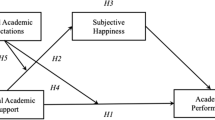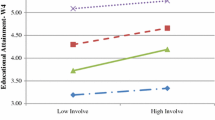Abstract
The present meta-analysis assessed concurrent and longitudinal associations between parental educational expectations and child achievement, and factors that mediate the effect of expectations on achievement. A systematic search in electronic databases identified 169 studies that were included in a random-effects meta-analysis. We found small to moderate bivariate cross-sectional (r = .30) and longitudinal associations (r = .28) between parental expectation and achievement which persisted after statistically controlling for socioeconomic status. Associations varied, in part, by children’s age, socioeconomic status, ethnicity, matching of type of expectations and achievement, type of expectation assessed, publication status, and informant. The analysis of cross-lagged effects indicated that parental expectations predicted change in child achievement, thus indicating that expectations had an effect over and above the effect of prior achievement. Effects of expectations on change in achievement were even stronger (r = .15) than the effects of achievement on change in expectation (r = .09). Parental expectations tended to be higher than the child achievement. Associations between expectations and achievement were partially mediated by educational expectations in the offspring, child academic engagement, and academic self-concept, and to a lesser extent, by parental achievement-supportive behaviors. We conclude that parents are recommended to communicate positive educational expectations to their children. The transmission of positive expectations to the offspring and the encouragement of academic engagement seem to be more effective in realizing parental expectations than parental behavioral academic involvement such as checking homework and staying in contact with teachers.

Similar content being viewed by others
References
Agliata, A. K., & Renk, K. (2008). College students’ adjustment: the role of parent–college student expectation discrepancies and communication reciprocity. Journal of Youth and Adolescence, 37(8), 967–982.
Balboni, G., & Pedrabissi, L. (1998). School adjustment and academic achievement: parental expectations and socio-cultural background. Early Child Development and Care, 143(1), 79–93.
Bell, R. Q. (1968). A reinterpretation of the direction of effects in studies of socialization. Psychological Review, 75(2), 81–95.
Borenstein, M., Hedges, L. V., Higgins, J., & Rothstein, H. (2005). Comprehensive meta-analysis (version 2). Englewood: Biostat.
Borenstein, M., Hedges, L. V., Higgins, J., & Rothstein, H. (2009). Introduction to meta-analysis. Chichester: Wiley.
Brandtstädter, J., & Rothermund, K. (1993). The life-course dynamics of goal pursuit and goal adjustment: a two-process framework. Developmental Review, 22(1), 117–150.
Briley, D. A., Harden, K. P., & Tucker-Drob, E. M. (2014). Child characteristics and parental educational expectations: evidence for transmission with transaction. Developmental Psychology, 50(12), 2614–2632.
Brookover, W. B., LiPere, J. M., Hamachek, D. E., Thomas, S., & Erikson, E. L. (1965). Self-concept of ability and school achievement, 2. East Lansing: Michigan State University, Office of Research and Publications.
Castro, M., Expósito-Casas, E., López-Martín, E., Lizasoain, L., Navarro-Asencio, E., & Gaviria, J. L. (2015). Parental involvement on student academic achievement: a meta-analysis. Educational Research Review, 14(1), 33–46.
Cheung, M. W.-L., & Cheung, S. F. (2016). Random-effects models for meta-analytic structural equation modeling: review, issues, and illustrations. Research Synthesis Methods, 7(2), 140–155.
Cheung, C. S.-S., & Pomerantz, E. M. (2015). Value development underlies the benefits of parents’ involvement in children’s learning: a longitudinal investigation in the United States and China. Journal of Educational Psychology, 107(1), 309–320.
Cohen, J. (1992). A power primer. Psychological Bulletin, 112(1), 155–159.
Danişman, Ş. (2017). The effect of expectation on student achievement. In E. Karadag (Ed.), The factors affecting student achievement: Meta-analysis of empirical studies (pp. 245–277). Cham: Springer.
Duval, S., & Tweedie, R. (2000). Trim and fill: a simple funnel-plot-based method of testing and adjusting for publication bias in meta-analysis. Biometrics, 56(2), 455–463.
Eccles, J. S. (1993). School and family effects on the ontogeny of children’s interests, self-perceptions, and activity choices. In R. Dienstbier & J. E. Jacobs (Eds.), Developmental perspectives on motivation (pp. 145–208). Lincoln: University of Nebraska Press.
Entwisle, D. R., & Hayduk, L. A. (1978). Too great expectations: The academic outlook of young children. Baltimore: Johns Hopkins University Press.
Fernández-Reino, M., & Creighton, M.J. (2016). Effort, optimism and the expectations-achievement paradox among ethnic minorities in England. Available online at available online at: Htpps://paa.confex.com (accessed 2019-06-03).
Gill, S., & Reynolds, A. J. (1999). Educational expectations and school achievement of urban African American children. Journal of School Psychology, 37(4), 403–424.
Goldenberg, C., Gallimore, R., Reese, L., & Garnier, H. (2001). Cause or effect? A longitudinal study of immigrant Latino parents’ aspirations and expectations, and their children’s school performance. American Educational Research Journal, 38, 547–582.
Gollwitzer, M., Thorwart, A., & Meissner, K. (2018). Psychological responses to violations of expectations. Frontiers in Psychology, 8, 2357.
Harter, S. (1985). Manual for the self-perception profile for children. Denver: University of Denver.
Heckhausen, J., Chang, E. S., Greenberger, E., & Chen, C. (2012). Striving for educational and career goals during the transition after high school: what is beneficial? Journal of Youth and Adolescence, 42(9), 1385–1398.
Hofstede, G. (2001). Culture’s consequences: Comparing values, behaviors, institutions, and organizations across nations (2nd ed.). London: Sage.
Hughes, J. N., Kwok, O.-M., & Hee, M. (2013). Effect of retention in first grade on parents’ educational expectations and children’s academic outcomes. American Educational Research Journal, 50(6), 1336–1359.
Jeynes, W. H. (2003). The effects of parental involvement on minority children’s academic achievement. Education and Urban Society, 35(2), 202–218.
Jeynes, W. H. (2005). A meta-analysis of the relation of parental involvement to urban elementary school student academic achievement. Urban Education, 40(3), 237–269.
Jeynes, W. H. (2007). The relationship between parental involvement and urban secondary school student academic achievement: a meta-analysis. Urban Education, 42(1), 82–110.
Lipsey, M. W., & Wilson, D. B. (2001). Practical meta-analysis. Thousand Oaks: Sage.
Loughlin-Presnal, J., & Bierman, K. L. (2017). How do parent expectations promote child academic achievement in early elementary school? A test of three mediators. Developmental Psychology, 53(9), 1694–1708.
Mello, Z. R. (2008). Gender variation in developmental trajectories of educational and occupational expectations and attainment from adolescence to adulthood. Developmental Psychology, 44(4), 1069–1080.
Pekrun, R., Lichtenfeld, S., Marsh, H. W., Muramaya, K., & Goetz, T. (2017). Achievement emotions and academic performance: longitudinal models of reciprocal effects. Child Development, 88(5), 1653–1670.
Philippson, S. (2013). Parental expectations: the influence of significant other on school achievement. In S. Philippson, K. Y. Ku, & S. N. Philippson (Eds.), Constructing educational achievement: A sociocultural perspective (pp. 87–104). New York: Routledge.
Pingault, J. B., Côté, S. M., Petitclerc, A., Vitaro, F., & Tremblay, R. E. (2015). Assessing the independent contribution of maternal educational expectations to children’s educational attainment in early adulthood: a propensity score matching analysis. PLoS One, 10(3), e0119638.
Reynolds, J. R., & Pemberton, J. (2001). Rising college expectations among youth in the United States: a comparison of the 1979 and 1997 NLSY. The Journal of Human Resources, 36, 703–726.
Rosenthal, R. (1991). Meta-analytic procedures for social research. Newbury Park: Sage.
Sameroff, A. (2009). The transactional model of development: How children and contexts shape each other. Washington, DC: American Psychological Association.
Seginer, R. (1983). Parents’ educational expectations and children’s academic achievements: a literature review. Merrill-Palmer Quarterly, 29(1), 1–23.
Simpkins, S. D., Fredricks, J. A., & Eccles, J. S. (2012). Charting the Eccles’ expectancy-value model from mothers’ beliefs in childhood to youths’ activities in adolescence. Developmental Psychology, 48(4), 1019–1032.
Sobel, M. E. (1982). Asymptotic confidence intervals for indirect effects in structural equation models. Sociological Methodology, 13, 290–312.
Steinberg, L. (2016). Adolescence (11th ed.). Boston: McGraw-Hill.
Strom, R. E., & Boster, F. L. (2007). Dropping out of high school: a meta-analysis assessing the effect of messages in the home and in school. Communication Education, 56(4), 433–452.
Tan, C. Y. (2017). Examining cultural capital and student achievement: results of a meta-analytic review. Alberta Journal of Educational Research, 63(2), 139–159.
Vevea, J. L., & Woods, C. M. (2005). Publication bias in research synthesis: sensitivity analysis using a priori weight functions. Psychological Methods, 10(4), 428–443.
World Health Organization (2018). Child and adolescent health and development. http://www.searo.who.int/entity/child_adolescent/topics/adolescent_health/en/ (accessed 2018-06-04).
Yamamoto, Y., & Holloway, S. D. (2010). Parental expectations and children's academic performance in sociocultural context. Educational Psychology Review, 22(3), 189–214.
Funding
This study was conducted in the context of the Research Training Group “Expectation Maintenance vs. Change in the Context of Expectation Violations: Connecting Different Approaches” funded by the German Research Foundation (Deutsche Forschungsgemeinschaft, DFG Ref. no.: GRK 2271).
Author information
Authors and Affiliations
Corresponding author
Additional information
Publisher’s Note
Springer Nature remains neutral with regard to jurisdictional claims in published maps and institutional affiliations.
Electronic Supplementary Material
ESM 1
(DOCX 88 kb)
Rights and permissions
About this article
Cite this article
Pinquart, M., Ebeling, M. Parental Educational Expectations and Academic Achievement in Children and Adolescents—a Meta-analysis. Educ Psychol Rev 32, 463–480 (2020). https://doi.org/10.1007/s10648-019-09506-z
Published:
Issue Date:
DOI: https://doi.org/10.1007/s10648-019-09506-z




